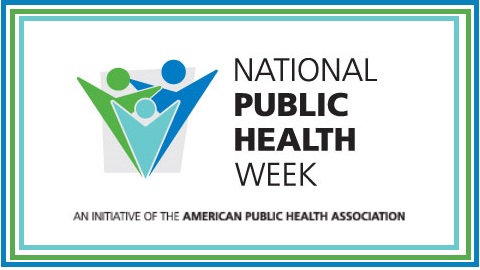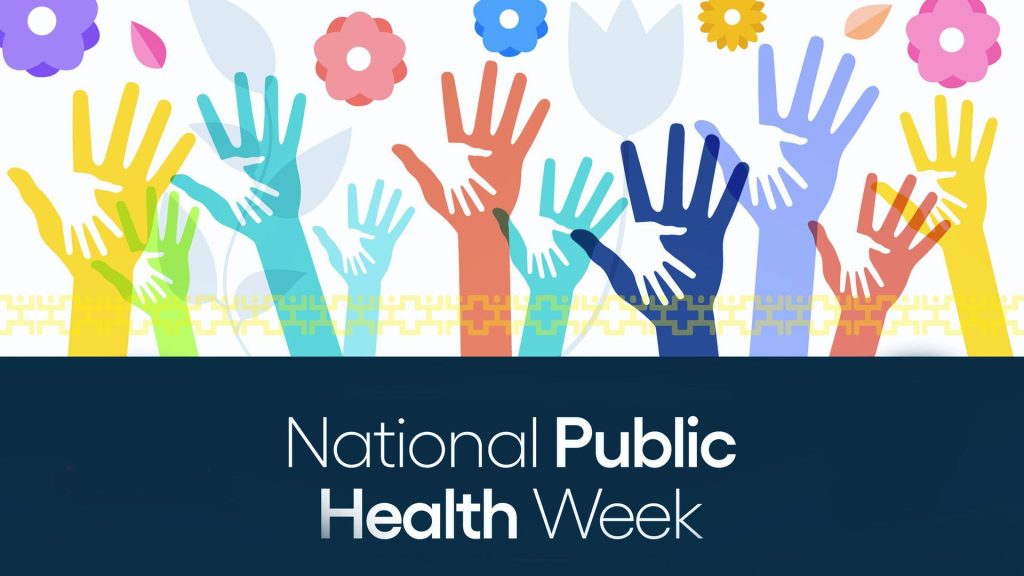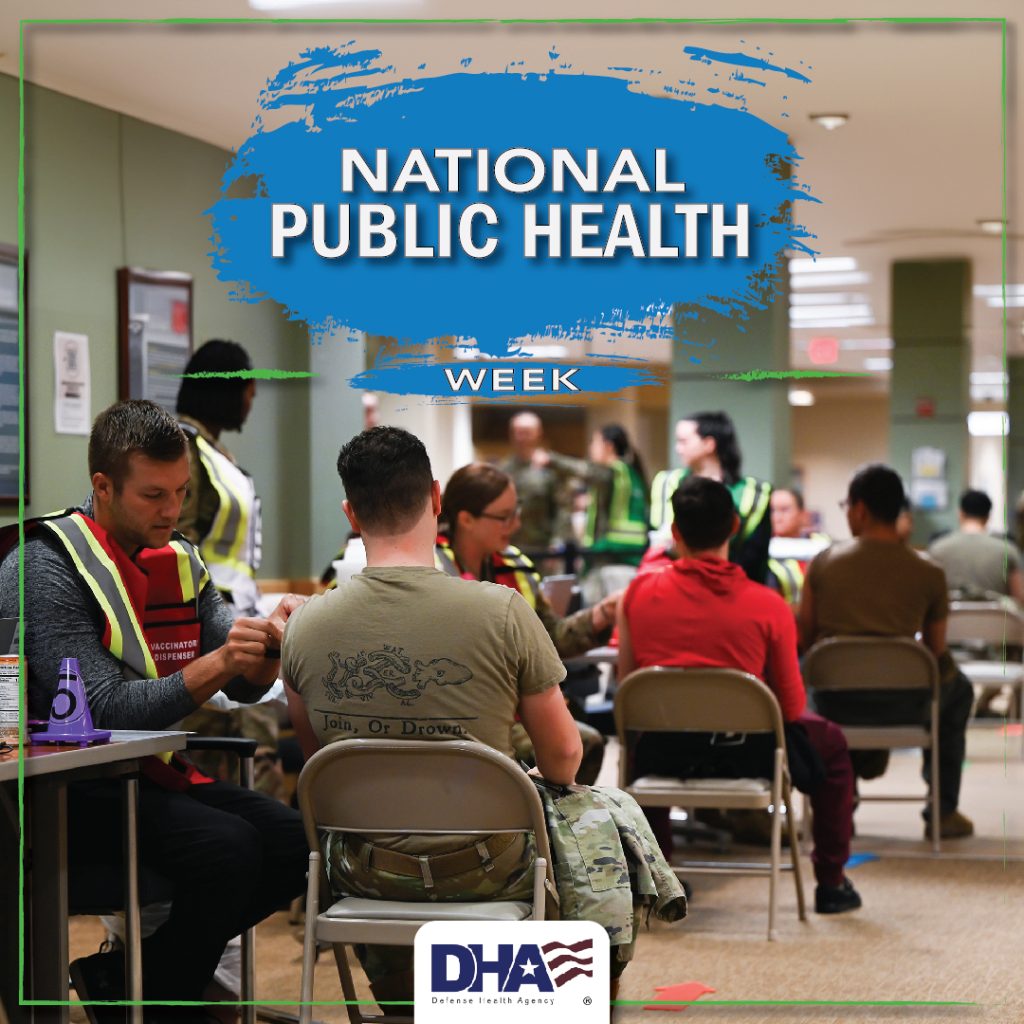
During the first full week of April each year, the American Public Health Association (APHA) brings together communities across the country to observe National Public Health Week (NPHW).
“Since 1995, when the first full week of April was declared National Public Health Week (NPHW), communities across the United States have observed the time as an opportunity to recognize the contributions of public health and highlight issues that are important to improving the public’s health. It’s a time to unite around critical issues and focus our collective energy on the singular goal of helping people live longer, happier, healthier lives.” [1]
“Public health is more than just health care. It’s the steps we take to make sure our neighborhoods and environment are free from pollution. It’s making sure our food and water are safe to eat and drink. It’s also the relationships we foster in our communities. We’re all interconnected. When we all come together to support public health, all of us — individuals, families, communities and the public health field — can achieve the goals of public health.” [2]

Why National Public Health week is important?
- “The power of community
National Public Health Week channels the power of community for the greater good. Health is a fundamental right. It’s a matter of public concern and should never be an individual struggle. We love how this week highlights what’s important.
- It’s educational
The week opens our eyes in several ways. It busts well-established myths around food and exercise. We have access to credible resources on diseases of all kinds. What’s more, it offers well-researched perspectives into equitable, inclusive public health (or lack thereof).
- It keeps you moving
It’s hard to stay still when everyone around is crushing a run or workout! National Public Health Week motivates even the laziest bums to make that first step towards a healthier lifestyle.” [4]

National Public Health Week: Disability and Accessibility
“Disability is a national public health issue needing special attention. We can ALL help to make our world a better place for individuals with disabilities.” [9]
“About 26% of U.S. adults have a disability, though Native Americans and senior citizens are disproportionately affected by disabilities. Adults with disabilities are also more likely to have heart disease, be smokers and have diabetes than the general population.” [7]
“To move toward health equity, it’s critical we recognize that people with disabilities are facing health disparities. One in three adults with disabilities does not have a primary health care provider, and one in three adults with disabilities has unmet health care needs due to financial cost. Since the passing of the Affordable Care Act, uninsured rates have decreased. Improving access to nutritious food — particularly in areas with limited access to fresh produce — has been linked to improving overall health and eating habits.” [7]
“We can improve the health of people living with disabilities and other marginalized groups by reducing healthcare disparities in health insurance, increasing physical accessibility to care, increasing availability of appropriate care, building more inclusive public health programs, and promoting healthy living.
It is vital to build supports with and through communities, not to and for them. This means that the development of programs, policies, and practices that affect adults living with disabilities should include their voices and opinions.” [8]

How to observe #NationalPublicHealthWeek
- Educate Yourself
“The first step in celebrating National Public Health Week is to educate yourself about important public health issues. How do you do this? Well, you can start by visiting the official National Public Health Week website, which provides a wealth of information about various public health topics.
You can also read articles, watch videos, or, if you don’t have time for any of that, you can listen to a podcast about health and wellbeing. Some of the subjects you may want to explore include healthy eating, physical activity, mental health, infectious diseases (spooky!), and environmental health. Dealer’s choice!” [5]
- Attend Local Community Events
“In observance of National Public Health Week, many community organizations and government agencies offer a series of events that invite local people to get involved. This might include lectures or seminars held at a university on topics related to public health, or it could be something more like a community health fair that educates as well as providing access to various resources and information to individuals and families. The week’s events might also include film screenings, symposiums, competitions and much more!” [3]

- Make Healthy Choices
“Can’t escape a health week without some physical care, now, can we? Making healthy choices is an important part (dare we say the most important part) of celebrating National Public Health Week. This includes eating a healthy diet, exercising regularly, and avoiding risky behaviors like smoking and excessive drinking. By making these choices, you can improve your own health and set a positive example for others in your community.
Not sure where to start? Begin your week with some easy yoga videos on YouTube, and maybe cut sugar out of your diet for 7 days. You will be shocked at how much better you feel, and we really mean that. If you can do that, you can do anything! Probably!” [5]
- Spread the Word
“One of the best ways to celebrate National Public Health Week is to spread the word about public health issues. Tell everyone you know that this is the time to make some serious life changes, even if they’re minor!
You can do this by sharing information with your friends and family members, posting on social media, or organizing a public event or presentation. By raising awareness about important public health issues, you can help to promote positive changes in your community.” [5]

- Take Care of Your Mental Health
“SELF! CARE! Don’t neglect it!
This includes taking time to relax and de-stress, seeking support from friends and family members, and seeking professional help if needed. By taking care of your mental health, you can improve your overall well-being and set a positive example for others in your community. Even if that community is your cat or dog. We don’t judge!” [5]
“Now is the time for every individual to pull together to make America a healthy nation and to bring health and prosperity to every American community. Knowing the proven relationship between a healthy lifestyle and disease prevention, personal health, and enabling people to take control to improve their health via health education is imperative. Knowledge = Power = Health!” [6]

Resources
[1] https://publichealth.pitt.edu/nphw
[3] https://www.daysoftheyear.com/days/national-public-health-week/
[4] https://nationaltoday.com/national-public-health-week/
[6] https://apuedge.com/5-ways-to-support-national-public-health-week-in-2016/
[7] https://nphw.org/Themes-and-Facts/2023-Accessibility
[8] https://mchd.org/national-public-health-week-looks-at-closing-the-health-equity-gap/
[9] https://www.apha.org/apha-communities/member-sections/disability-section
